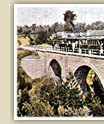
Economic developments follow a reasoning of their own and do not
fall under conventional patterns. General economic trends cover
large periods, they coincide however with the events of the conjuncture
of circumstances. The agricultural production remains the dominant
factor in the agricultural life of the country throughout the nineteenth
and the first half of the twentieth century. The economic developments
of the beginning of the twentieth century are determined to a large
extent by the modernizing economic policy adopted by Harilaos Trikoupis
in the previous phase and its consequences. The bankruptcy of 1893
resulted to establishment of the International Finacial Control
of 1898, which at the same time was related to the obligations imposed
by the 1897 defeat. Large works such as the railways, that have
been the basic choices of the Trikoupist period, are completed in
this phase and positively affect the whole of economy. Shipping
is in a constant process of growth with the definite passage from
sail to steam.
Between 1898 and 1909 economy begins to recover.
The policy of Georgios Theotokis, prime-minister for the greatest part of the period,
achieves a relative monetary and exchange stability.
At the same time, performance in foreign trade has improved, whereas the slight excess of imports
over exports is counter-balanced by the invisible resources originating from shipping
and immigration abroad. Some efforts are observed in the development of industry
to no avail though. The raisin issue held a prominent partr in the agricultural economy of southern Greece
of the time and triggered social disturbances, which had no spectacular
aftermath however.
Interest in the banking sector is not as intense as in the previous
phase. This trend resurfaces in the 1910's.
As concerns taxation, indirect taxation and the relatively small
participation in public burdens of high-income households are still the dominant trend.
|
